CameraQuest Home
Shopping Cart
Price List
Camera
Articles
I Buy / Wants Repairs Books Adapters
Canon P Rangefinder
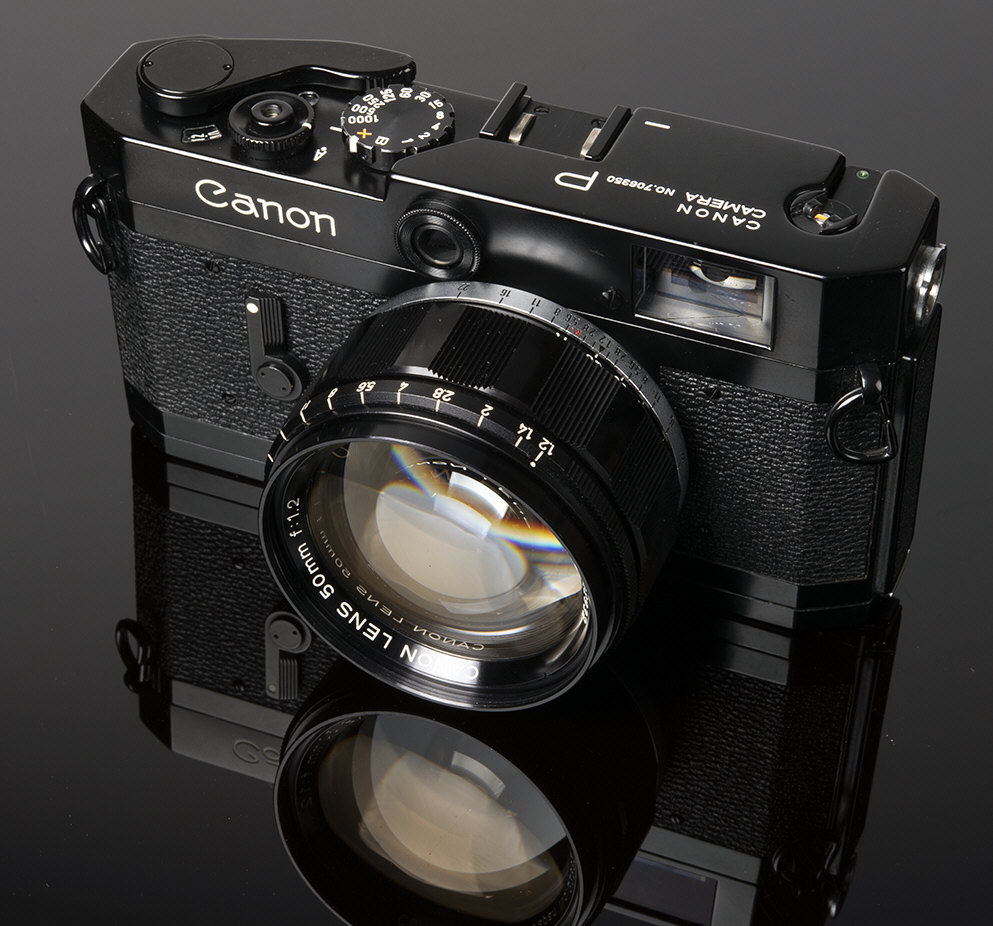
Produced
from 1958 to 1961, the P was among Canon's last screw mount rangefinders, a
modification of the VI-L. Incorporating many features into an
attractively priced package, the P was Canon's best selling screw mount
rangefinder until the Canon 7. About 100,000 were produced. Like
all but the earliest Canon Rangefinders, it uses the Leica Screw Mount, falling into
a larger class of "Leica Copies." Leica screw mount lenses or Canon screw
mount lenses (and indeed ANY Leica Screw mount lens made by any maker) can be used.
Black paint Leica mount Canon Rangefinders like this beautiful P are very rare.
Very few were made to begin with, fewer survived in this condition.
Probably only a few hundred black P's were produced.
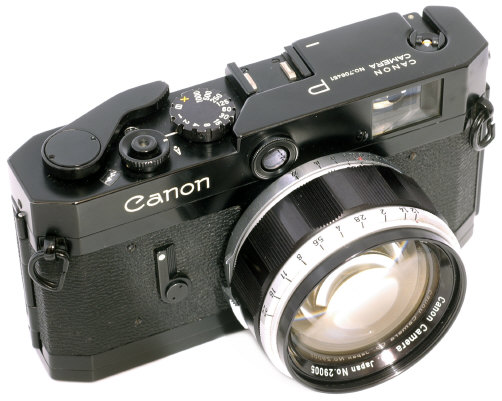
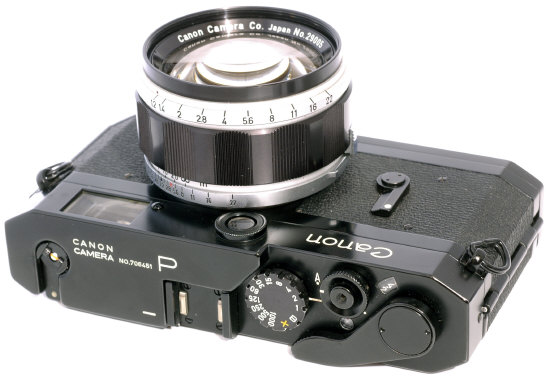
The P stood for "Populaire" and
was blessed with beautiful clean aesthetic lines. If there is
ever a "Prettiest" interchangeable rangefinder Beauty Contest, the Canon P
is sure to be one of the finalists. It is also one of the few Canon
rangefinders labeled on the top plate. Specs include a shutter
speed range of 1 to 1/1000, B, and X flash sync at 1/55th.
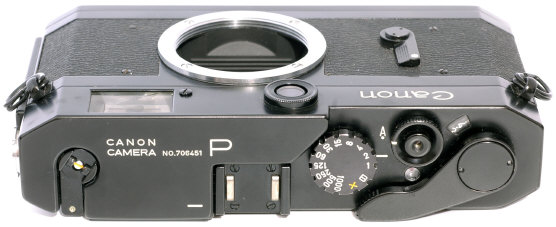
The top deck is blessed with a large comfortable advance
lever, a very large clearly marked shutter speed dial that even today M6 should envy, and
a self setting exposure counter. Turning the shutter release collar allows the film to
be rewound.
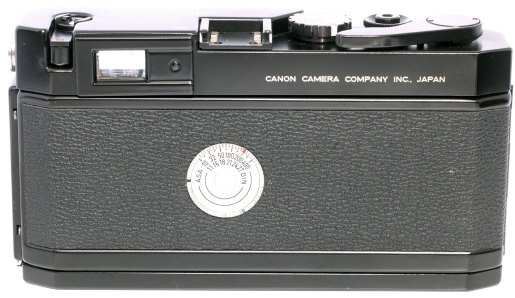
The finder is 1:1 life size and parallax
corrected, with always visible built in frames for the 35/50/100 lenses.
Compared to the
previous VI-L on which it was based, the VI-L's rotating 3 position prism finder was
substituted for a fixed finder with all 3 framelines visible at all time.
Unfortunately age has visited most P finders with more than their share of
flare, a problem that cleaning may help but seldom cures. Also a victim of the
lower selling price, the VI-L's excellent finder shoe self parallax correcting
accessory finder pin did not find its way to the P.
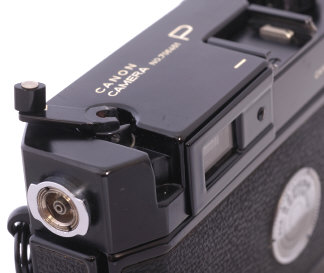
Note the very large and elegant rewind knob. If
they gave out Oscars for rewind knobs, this one would be in the running.
It folded back into the body in a rather nice and unusual way.
Also notice the large bayonet mount around the PC terminal to attach flash
units---a rather nice touch also used on Canon's previous V/VI lineup.
The X flash setting is 1/55th second. Etched framelines are visible at
the rear of the viewfinder.
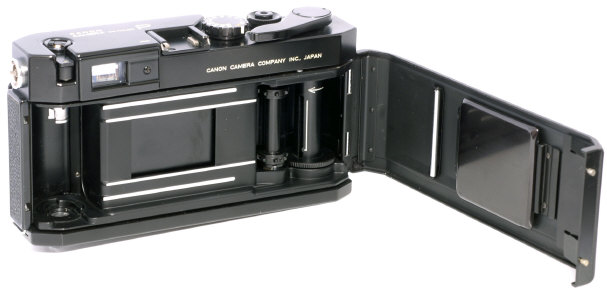
Above is a rare shot of a 18/1000 mm thick plastic coated
stainless steel shutter curtain WHICH HAS NOT BEEN CRINKLED. Nikon decided
to go with Titanium shutter curtains in the SP and Nikon F, and they proved
unbelievably durable. In contrast, the stainless steel curtains in the
later Canon RF's are EASILY crinkled. It is very unusual to find
unwrinkled Canon steel curtains today.
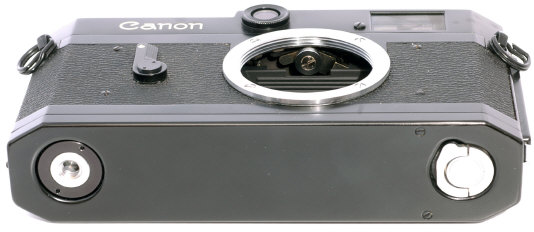
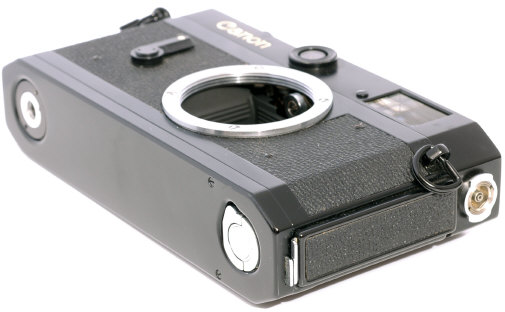
The back has an unusually secure double lock system. First
rotate the bottom key, which moves the safety latch out of the way, then pull down
the conventional side opening pin. It seems the designers were paranoid about
someone stealing the film.
With it's comfortable lever advance,
lever rewind, easy film loading, metal shutter curtains, and parallax corrected finder for
35, 50 and 100 lenses,
the Canon P is quite easily a superior shooter to any Leica screw
mount camera.
Still, there are better Canon
rangefinder choices.
Some claim the Canon P is the best of
the Canon Rangefinder bodies - mostly by people who have not tried all of
them.
While the P certainly is not a bad
camera, I much prefer the L1, VL, VTDM and 7sZ overall as more useful and
more pleasurable shooters.
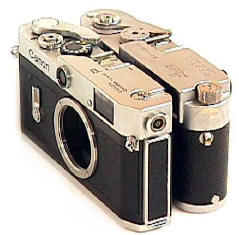
Side by side, The Canon P is about the same size and
weight as its toughest competition, the Leica M2.
Ironically made as an economy model,
the P was the LAST "bullet proof" Canon Rangefinder. The P and its near
siblings, the V, L, and VI series, are the high points of Canon Rangefinder construction.
No Canon since has had their combination of fine workmanship, very heavy
chrome plating, and thick top plates that could take an impact capable of destroying
many lesser cameras.
These are heavy duty cameras,
examples of a standard of workmanship and construction long gone past. You might not
be able to appreciate what I am talking about just by the pictures, but if you put these
cameras side by side the later 7 / 7s/ 7sZ, the difference in
construction quality quickly becomes obvious. The later Canons have much better
finders, but the V, L, VI, and P series are works of mechanical art.
Want more info on Canon Rangefinders? Buy Peter
Dechert's book Canon Rangefinder Cameras 1933-1968 and Peter Kitchingman's book
Canon M39 Rangefinder Lenses 1939-1971.
CameraQuest Home
Shopping Cart
Price List
Camera
Articles
I Buy / Wants Repairs Books Adapters
Revised:
May 21, 2021
. Copyright � 1998-2020
Stephen Gandy. All rights reserved. This means you may NOT
copy and re-use the text or the pictures in ANY other internet or printed
publication of ANY kind. Information in this document is subject to change
without notice. Other products and companies referred to herein are
trademarks or registered trademarks of their respective companies or mark
holders.









